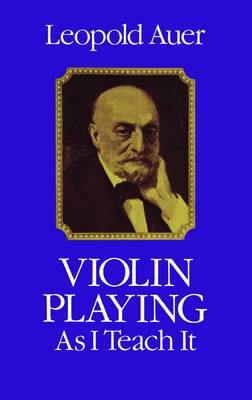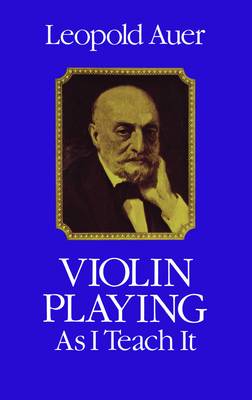
Bedankt voor het vertrouwen het afgelopen jaar! Om jou te bedanken bieden we GRATIS verzending (in België) aan op alles gedurende de hele maand januari.
- Afhalen na 1 uur in een winkel met voorraad
- In januari gratis thuislevering in België
- Ruim aanbod met 7 miljoen producten
Bedankt voor het vertrouwen het afgelopen jaar! Om jou te bedanken bieden we GRATIS verzending (in België) aan op alles gedurende de hele maand januari.
- Afhalen na 1 uur in een winkel met voorraad
- In januari gratis thuislevering in België
- Ruim aanbod met 7 miljoen producten
Zoeken
€ 12,45
+ 24 punten
Uitvoering
Omschrijving
Leopold Auer (1845-1930) belonged to that select company of violin virtuosos who not only established the level of artistic excellence for the nineteenth century, but also trained many of the violinists who surpassed that level in the twentieth. Mischa Elman, Jascha Heifetz, and Efrem Zimbalist (Sr.) were among Auer's students. Himself a pupil of the great Joseph Joachim, Auer will always be regarded as one of the most important violin pedagogues in history.
This exemplary collection of principles and guidelines was set down by the master after a lifetime of playing and teaching. Auer taught by example, and he directs violin teachers to inculcate the intricacies of execution by means of the violin itself, not simply by verbal instruction. He then devotes the rest of his advice to the violin pupil: how to hold the violin and bow, how to practice, and how to approach such matters of technique as tone production, vibrato, bowing methods including the legato, left-handed technique, double stops, trills, pizzicato, harmonics, and phrasing. In the concluding chapters Auer takes up the more general topics of style, stage fright, changes in the violin repertory, and, of great historical interest, his practical repertory hints ― what he gave his own students to play. Many of the book's chapters are illuminated by biographical details and anecdotes about famous musicians whom Auer knew: Davidov, Wieniawski, Seidel, Wilhemj, Sarasate, and von Bulow.
Receiving poor direction at an early age is disastrous for a violinist. As Auer says, "There is no instrument whose absolute mastery at a later period presupposes such meticulous care and exactitude in the initial stages of study as does the violin." With this book every beginning violin student will have the benefit of the finest guidance.
This exemplary collection of principles and guidelines was set down by the master after a lifetime of playing and teaching. Auer taught by example, and he directs violin teachers to inculcate the intricacies of execution by means of the violin itself, not simply by verbal instruction. He then devotes the rest of his advice to the violin pupil: how to hold the violin and bow, how to practice, and how to approach such matters of technique as tone production, vibrato, bowing methods including the legato, left-handed technique, double stops, trills, pizzicato, harmonics, and phrasing. In the concluding chapters Auer takes up the more general topics of style, stage fright, changes in the violin repertory, and, of great historical interest, his practical repertory hints ― what he gave his own students to play. Many of the book's chapters are illuminated by biographical details and anecdotes about famous musicians whom Auer knew: Davidov, Wieniawski, Seidel, Wilhemj, Sarasate, and von Bulow.
Receiving poor direction at an early age is disastrous for a violinist. As Auer says, "There is no instrument whose absolute mastery at a later period presupposes such meticulous care and exactitude in the initial stages of study as does the violin." With this book every beginning violin student will have the benefit of the finest guidance.
Specificaties
Betrokkenen
- Auteur(s):
- Uitgeverij:
Inhoud
- Aantal bladzijden:
- 128
- Taal:
- Engels
- Reeks:
Eigenschappen
- Productcode (EAN):
- 9780486239170
- Verschijningsdatum:
- 1/02/1980
- Uitvoering:
- Paperback
- Formaat:
- Trade paperback (VS)
- Afmetingen:
- 137 mm x 214 mm
- Gewicht:
- 140 g

Alleen bij Standaard Boekhandel
+ 24 punten op je klantenkaart van Standaard Boekhandel
Beoordelingen
We publiceren alleen reviews die voldoen aan de voorwaarden voor reviews. Bekijk onze voorwaarden voor reviews.









